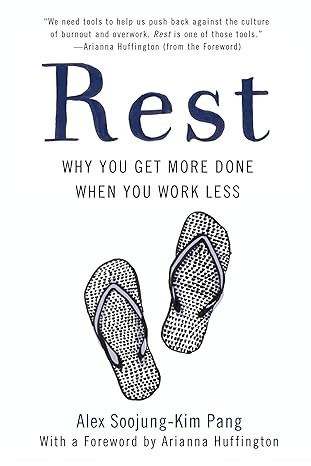The Art of Resting: How Disconnecting Can Fuel Your Vocational Aspirations
Rest isn't the absence of work; it's a tool for success. By embracing intentional breaks and recharging, you can boost creativity, stay energized, and deliver high-quality work without burnout.
It took me years to understand—and I still struggle with the notion—that disconnecting from work is not only necessary but critical to staying fresh, creative, and energized. For a long time, I felt guilty about taking time off. If I wasn't pushing myself to the limit, I feared I wasn’t doing enough to meet my goals. It wasn’t until I read Rest: Why You Get More Done When You Work Less by Alex Soojung-Kim Pang that I recognized the problem: I was dealing with guilt, not laziness. And that guilt was holding me back.
In his book, Pang delves into the importance of purposeful rest, showing how taking time away from work can unlock creativity and enhance productivity. For me, this concept was transformative. I realized that rest isn't just the absence of work; it's an active part of doing my best work.
Since embracing the idea that rest is fuel, I’ve shifted how I approach my day and how I think about balance. I’ve found that organizing my day around natural energy cycles makes a world of difference. I now load the front of my day with heavier, more creative tasks that require deep concentration. Tackling these first, while my mind is fresh, allows me to operate at my peak efficiency. By noon, I’ve already made significant headway.

But I don’t just plow through the day without pause. Instead, I take mini-moments throughout to recharge. These aren’t lengthy breaks, but small interludes designed to reset my focus. It could be a 15-minute brisk walk, a chapter from a book, or a few minutes of music that centers my mind. These micro-breaks allow me to step back, gain perspective, and come back to my work with renewed clarity.
When I take time off, I do so with intent. I used to believe that simply stepping away from work would magically help me recover from burnout. But I’ve learned that it’s how I spend my time off that matters. Whether it's planning a weekend away or simply setting aside time to explore a new hobby, I approach rest with as much purpose as I do work. This intentionality in my downtime helps me return to my professional life recharged and ready to engage.
Another change I’ve implemented is altering where I work during the week. I change my physical environment, whether it’s moving from my home office to a different room or even working from a café. This shift in setting is a simple yet powerful way to keep things fresh and stimulate new thinking.
Resting is no longer a guilty pleasure for me—it’s a strategy. By channeling my energy into other facets of my life, whether it’s physical activity, personal learning, or simply unwinding, I find that I’m more effective at work. The more I embrace the art of rest, the more fuel I have to pursue my vocational aspirations with clarity and passion.
Steps to Rest While Still Delivering
If you're finding it difficult to rest without feeling like you're falling behind, here are actionable steps to help you integrate rest into your routine and still meet your goals:
- Plan Your Day Around Your Energy Levels
- Frontload your day with tasks that require deep focus and creativity. Schedule your most mentally demanding tasks during the hours when you are most alert and energized, usually in the morning.
- Leave less cognitively demanding tasks, such as emails or administrative work, for later in the day.
- Take Mini-Moments to Recharge
- Instead of pushing through long work hours without breaks, take short, intentional pauses throughout the day. A 10-15 minute brisk walk, a chapter of a book, or a brief music break can reset your mind and prevent burnout.
- Schedule these breaks as non-negotiable parts of your day to ensure you give yourself time to recharge.
- Be Intentional with Your Time Off
- When you take days off, plan them with purpose. Don’t simply “veg out”—engage in activities that energize you, like a hobby or spending time outdoors.
- Disconnect from work fully to allow your brain to reset. Avoid checking emails or thinking about work so you can return recharged.
- Use Different Workspaces to Refresh Your Mind
- Change your environment during the week to keep things interesting. Work from different rooms in your home, a café, or even a co-working space. A change of scenery can stimulate creativity and help you see problems from a fresh perspective.
- Set Clear Boundaries
- Let your colleagues know when you are taking time off or unavailable. Set boundaries by establishing specific hours when you are "off" to prevent work from encroaching on your rest time.
- Turn off notifications when you're resting, allowing yourself to fully disconnect.
- Incorporate Physical Activity
- Physical movement is a powerful way to reset your mind. Even short bursts of activity like stretching or walking can boost your energy levels and keep you focused when you return to work.
- Reflect and Adjust
- At the end of each day, reflect on what worked and what didn’t. Adjust your schedule to maximize your productivity during work hours and ensure you’re getting enough rest.
- Use journaling or mindful reflection to help process your day and prepare mentally for the next.
Conclusion: Rest Is a Tool for Success
Resting is not the opposite of work; it's a tool that can amplify your success. By strategically incorporating rest into your life, you'll be able to deliver high-quality work without burning out. Let go of the guilt and see rest for what it is: an essential ingredient to staying energized, creative, and focused on your vocational goals.



